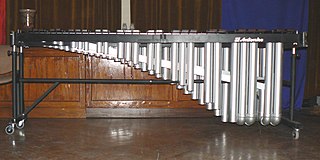
The marimba is a percussion instrument consisting of a set of wooden bars struck with yarn or rubber mallets to produce musical tones. Resonators or pipes are suspended underneath the bars to amplify their sound. The bars of a chromatic marimba are arranged like the keys of a piano, with the groups of two and three accidentals raised vertically, overlapping the natural bars to aid the performer both visually and physically. This instrument is a type of idiophone, but with a more resonant and lower-pitched tessitura than the xylophone. A person who plays the marimba is called a marimbist or a marimba player.
Jamshied Sharifi is an American composer and musician. He was born in Topeka, Kansas to an Iranian father and an American mother. At an early age, Sharifi was exposed to Jazz and Middle Eastern music by his father and to European classical and church music by his mother. He began to study classical piano at age five and quickly developed a thirst for musical instruction and a desire to improvise. At age nine he began studying guitar and drums, and at age ten added flute.
The music of Iran encompasses music that is produced by Iranian artists. In addition to the traditional folk and classical genres, it also includes pop and internationally celebrated styles such as jazz, rock, and hip hop.

Hossein Alizadeh is an Iranian musician, composer, radif-preserver, researcher, teacher, and tar, shurangiz and setar instrumentalist and improviser. He has performed with such musicians as Shahram Nazeri, Mohammad-Reza Shajarian, Alireza Eftekhari and Jivan Gasparyan, as well as with a number of orchestras and ensembles.

Loris Haykasi Tjeknavorian is an Iranian Armenian composer and conductor. He has appeared internationally as a conductor, serving as the principal conductor of the Armenian Philharmonic Orchestra from 1989 to 1998 and later from 1999 to 2000. As a composer Tjeknavorian has written 6 operas, 5 symphonies, choral works, chamber music, ballet music, piano and vocal works, concerti for piano, violin, guitar, cello and pipa, as well as music for documentary and feature films. Among his best known works are the opera Rostam and Sohrab, based on the story of Rostam and Sohrab from Ferdowsi's Shahnameh, and the ballet Simorgh.
Iranian rock refers to rock music produced by Iranian artists. Rock music has been popular in Iran since the late forties, with the emergence of singers such as Kourosh Yaghmaei, Farhad Mehrad, Fereydoon Foroughi and Habib Mohebian, but was largely forgotten after the Iranian Revolution. Like most rock styles, electric guitar and bass guitar and drums are the main instruments in this type of music. In some groups, the keyboard also has the task of adjusting the rhythms and symbols.
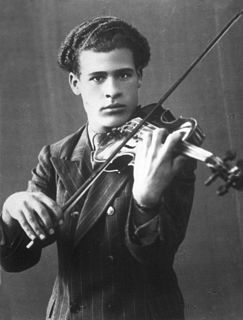
'Ostad (“Master”) Mahmoud Zoufonoun' was an accomplished musician in the art of Persian traditional music.

Bijan Mortazavi is an Iranian virtuoso violinist, musician, composer, songwriter, arranger and singer.

The Mastān Ensemble is an Iranian musical group performing traditional Persian music.

Reza Ghassemi is an Iranian novelist and musician.
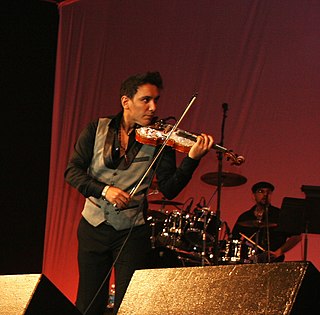
Shadmehr Aghili is an Iranian pop singer, musician, composer, music arranger, producer and song-writer, and formerly an actor. He revitalized music culture post-revolution in Iran, Aghili was born in Tehran, Iran and later emigrated to Canada first, but currently resides in Los Angeles.
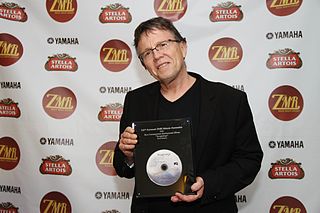
Paul Adams is an American musician, writer and musical instrument builder.

The Once is a folk trio based in St. John's, Newfoundland, Canada. The group features Geraldine Hollett on lead vocals and vocalist-instrumentalists Phil Churchill and Andrew Dale playing a variety of instruments. The group performs a mix of original and traditional material and is noted for their three part harmonies, which are sometimes performed a cappella.

Pejman Azarmina is an Iranian-American scholar, entrepreneur, musician and thinkocrat. After 15 years of pursuing a career in the pharmaceutical industry, he joined UCLA as a faculty member to establish the Office of Physician Scientist Career Development within the David Geffen School of Medicine. Earlier in his career, his interest in leadership development led to the formation of multiple tools, projects and initiatives aiming to develop the next generation of holistic leaders and systems thinkers under the umbrella term of Thinkocrats.

Mohammad-Reza Darvishi is an Iranian musician, researcher, and author of Encyclopedia of the Musical Instruments of Iran, a Klaus P. Wachsmann Prize-winner book about Iranian musical instruments.
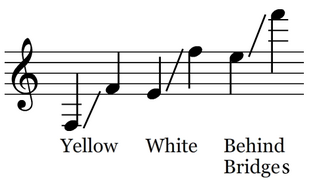
The santur (Persian: سنتور, is a hammered dulcimer of Iranian or Mesopotamian origins.

Kristi Mühling is a professional Estonian chromatic kannel player who specialises mainly on classical and contemporary music. She has premiered numerous compositions for this instrument, both as a soloist and chamber musician. She is a member of regularly performing ensembles such as Resonabilis and Una Corda. Kristi Mühling is also the founder of the chromatic kannel specialty at the Estonian Academy of Music and Theatre and has worked there since the establishment of the specialty in 2002.

Kourosh Yaghmaei is an Iranian singer-songwriter, composer and record producer, who started his career in the early 1970s. Regarded as one of the greatest Persian psychedelic rock musicians in the history of Iranian rock music, he is known as "the Godfather of Iranian psychedelic rock", as well as "the king of rock".

Pouya Saraei is an Iranian Composer and Arranger, conductor, lecturer, Critique, Researcher and Santour Instrumentalist. He started playing Santur from age of seven and some of his music Masters were: Javad Bathaie, Faramarz Payvar, Hossein Alizadeh, Pashang Kamkar, Dariush Talai, Mostafa Kamal Pourtorab, Dr.Hassan Riahi, Sharif Lotfi, Farid Omran, Majid Derakhshani, Mohammad-Reza Lotfi, etc.

Ehsan Matoori is an Iranian American composer, film score composer[1], record producer and Iranian santoor player based in New York. Ehsan Matoori began learning Santoor (Persian-dulcimer) based on Maestro Faramarz Payvar’s method at age 9. He studied instrumental and vocal Radif with Parviz Meshkatian and Pashang Kamkar and later started teaching Santoor. Ehsan took lessons from Ardavan Kamkar, one of the greatest contemporary Santoor players of Iran known for his distinct playing style and tuning techniques. In addition to playing Santoor, Ehsan has studied music composition and harmony with Farhad Fakhroaldini and children’s’ music with Soudabeh Salem.

















